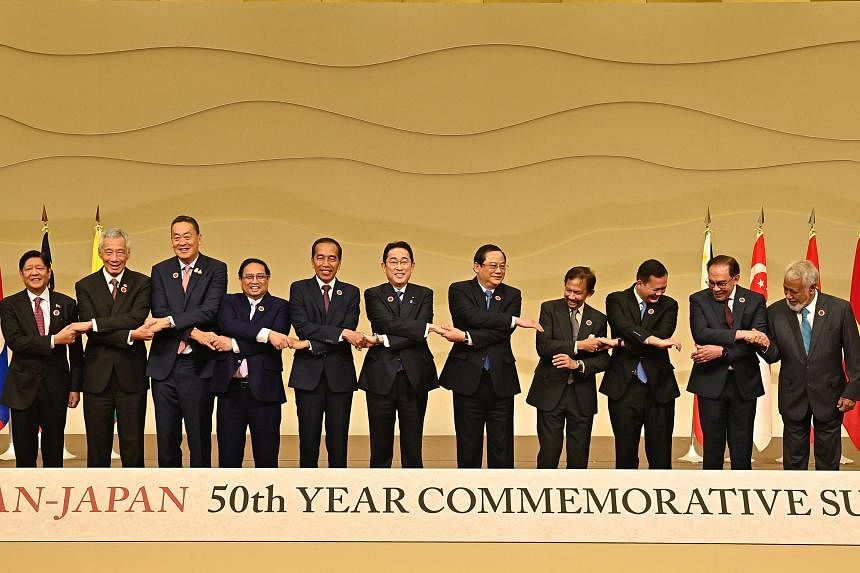TOKYO – Asean and Japan should redouble efforts to deepen economic cooperation, and it is timely to consider an upgrade of the trade pact between both sides, said Singapore’s Prime Minister Lee Hsien Loong on Dec 17.
He also said an Asean-Japan Air Services Agreement, if concluded, would be mutually beneficial.
Speaking at a commemorative summit in Tokyo to mark the golden jubilee of Asean-Japan relations, PM Lee noted that Japan was the first country to begin dialogue with Asean in 1973, through a forum to discuss its exports of synthetic rubber.
Since then, Japan’s relationship with the grouping has been anchored on economic engagement, he said.
“Japan’s rapid economic growth became the inspiration and impetus for the development of many countries in the region, following the flying geese model,” PM Lee said, referring to the spillover impact of Japanese economic dynamism into the region.
Japan’s investments in South-east Asia and the transfer of know-how, had “greatly helped Asean shorten our developmental curve”, he added.
During the summit, the leaders discussed economic and people-to-people exchanges, among other issues.
The event at The Okura Tokyo hotel was attended by Japanese Prime Minister Fumio Kishida and leaders of South-east Asian countries except Myanmar, which was not invited due to its military coup d’etat.
To mark their semi-centennial, PM Lee noted that Japan and Asean have already taken major steps to chart the future of economic cooperation.
In August, Japan and Asean unveiled a 10-year joint action plan on economic partnership, which PM Lee described as “an important ‘living’ document that will chart economic cooperation for the next decade”.
The comprehensive 38-page document includes steps that Japan and Asean can take on the emerging areas of digitalisation, sustainability and supply chain resilience.
That month, Asean and Japan also issued a so-called Economic Co-Creation Vision document, which identified areas such as open innovation and human capital development that will make Asean’s and Japan’s economies more competitive and vibrant, PM Lee said.
Singapore welcomes Mr Kishida’s proposal for Asean and Japan to cooperate in building a next-generation automotive industry, centred on decarbonised power sources and manufacturing processes, he added.
Intricate economic ties already exist between Asean member states and Japan, as seen in a wide array of cooperation and regional free trade arrangements.
These include the Asean-led 15-nation Regional Comprehensive Economic Partnership and the 11-nation Comprehensive and Progressive Agreement for Trans-Pacific Partnership.
Singapore is also convening, together with Japan and Australia, the World Trade Organisation Joint Statement Initiative on e-Commerce, PM Lee pointed out.
“These forums each have their roles,” PM Lee said. “But while we pursue these diverse collaborations, it is important that... between Asean and Japan, both sides similarly redouble our efforts to deepen our economic cooperation.”
To this end, he identified the digital and green economies as key sectors.
On digitalisation, where Japan’s collaboration includes initiatives with the Asean-Singapore Cybersecurity Centre of Excellence, he said: “We should continue working towards an open, inclusive and interoperable digital ecosystem.”
And on the environment, he highlighted the Japan-led Asia Zero Emission Community (Azec) initiative to promote the decarbonisation of Asia, through customised pathways tailored to each nation’s circumstances to support their green transition.
Leaders will attend an Azec meeting on Dec 18, the last of three days of events.
“In addition to these initiatives, Singapore suggests that it is timely to consider upgrading the Asean-Japan free trade agreement, to promote these emerging areas of digital and sustainability,” said PM Lee. “This would clearly show that both sides are committed to taking Asean-Japan economic cooperation to the next bound.”
The free trade agreement entered into force in 2008. It was amended in 2020 to include provisions in trade in services and movement of people, among other areas.
In a separate speech, PM Lee said the multifaceted Asean-Japan relationship is underpinned by people-to-people ties.
“Our warm friendship and close ties have grown over the decades of interaction and exposure to each other’s cultures and ways of life,” he said, observing that Japanese cuisine is popular and its brands are household names.
One symbol of strong people-to-people ties is the Japan Creative Centre in Singapore, which was launched in 2009 and continues to showcase Japanese culture and technologies, he added.
PM Lee also noted that Japan is a popular tourist destination for South-east Asians – and vice versa.
“The demand for air travel will continue to grow,” he said, suggesting that an Asean-Japan Air Services Agreement will be “mutually beneficial, and will boost our people-to-people and economic ties”.
Such agreements guarantee the stable operation of scheduled air services, and may include exemptions on taxes and other fees. Asean has signed similar arrangements with China, New Zealand and the European Union.
Looking ahead, PM Lee said Asean’s partnership with Japan in the next 50 years must focus on youth, particularly through scholarships and exchange programmes.
“Building the ties between our peoples across generations is an important long-term strategic task,” he said.


